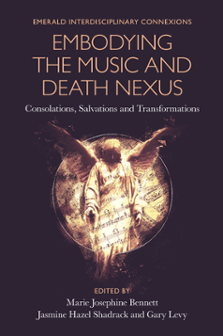
Life Beyond Death: Mourning, Mythology and the Sound of Loss
Embodying the Music and Death Nexus
ISBN: 978-1-80117-767-2, eISBN: 978-1-80117-766-5
Publication date: 17 August 2022
Citation
(2022), "Life Beyond Death: Mourning, Mythology and the Sound of Loss", Bennett, M.J., Shadrack, J.H. and Levy, G. (Ed.) Embodying the Music and Death Nexus (Emerald Interdisciplinary Connexions), Emerald Publishing Limited, Leeds, pp. 143-143. https://doi.org/10.1108/978-1-80117-766-520221019
Publisher
:Emerald Publishing Limited
Copyright © 2022 Marie Josephine Bennett, Jasmine Hazel Shadrack and Gary Levy. Published under exclusive licence by Emerald Publishing Limited
In this fourth and final trio of essays, the embodied music and death nexus manifests in three very different contexts, with some points of overlap, as well as difference. For Matthew McCullough and Marek Jeziński, historically momentous political events provide the background and content for the music they explore, inspired by the death of significant figures in the lives of composers and songwriters. In McCullough's penetrating and illuminating study of Sir Arthur Bliss's Morning Heroes, it was the death of Bliss's beloved brother on the World War I battlefield that provided the catalyst for the musical work. Fifty years later, on another continent and in very different times, the assassination of US President John F. Kennedy became the moment from which a whole generation of popular musical responses began, and for which Jeziński provides a broad yet incisive overview. Popular music is also one of the most common genres that Janieke Bruin-Mollenhurst discovered as the music of choice for bereaved family members, at the funerals and in the death cafes, for their loved ones. Whether the music is a favourite of the deceased, or evokes something meaningful for the bereaved, it serves to symbolise or embody an enduring bond between the living and the dead. That bond remains deeply personal, felt in and contained by the body of the bereaved. Bliss's love for his brother, and the pain of that loss, was equally personal. Yet, the personal can also become mythical, through the heroisation of the lost object of love. McCullough and Jeziński are both interested in exploring this process of transmutation through the medium of music in their essays. Bliss's fallen brother is elevated to the status of hero through his choice of texts and the musico-funerary major composition he created in that brother's memory. The substantial body of popular music created in the days, months and years following Kennedy's assassination can also be understood, in Jeziński's analysis, as simultaneously helping to create the figure of Kennedy as mythological hero while also inspiring further responses to that popular symbol. Separately and together these three essays offer detailed and distinctive examples of the many different ways in which the death of any one person, known or otherwise, has the power to evoke powerful urges to embody and perpetuate the memory of that person either in a suitable musical form or as an enduring musical accompaniment.
- Prelims
- Section 1 Death and the Canon: Classical Entanglements of Death, Grief and Perspective
- Chapter 1 Permeating the Membrane: Death as Life-Fulfilment Through the Prism of Bach's Ich habe genug (BWV 82)
- Chapter 2 Mozart's Music in Film: Death and Embodied Affect
- Chapter 3 Mahler's Second Symphony: Intuitively Embodying Grief and Dying
- Section 2 Chthonics: Travelling Through Death on Black Metal's Wings
- Chapter 4 Death as Negation: Black Metal's Disturbing Apophatic Insight
- Chapter 5 ‘I Saw the End’: An Autoethnographic Exploration of Music, Cancer Treatment and Death
- Chapter 6 Abyssal Noise: Representations of Death and Dying in Extreme Metal Music
- Section 3 Death and Resurrection: Marginalised Voices
- Chapter 7 Naked History: A Musical Embodiment
- Chapter 8 Death and a Life: Renihilative Metamorphosis
- Chapter 9 Regulation, Resistance and Resurrection
- Section 4 Life Beyond Death: Mourning, Mythology and the Sound of Loss
- Chapter 10 Sounding the Architecture of Grief: Requiem, Rhetoric and Embodied Experience
- Chapter 11 Experiencing the Sound of Loss: Music and Bereavement Theory
- Chapter 12 Between a Man and a Myth: The Death of John Fitzgerald Kennedy and Popular Music
- Epilogue
- Index